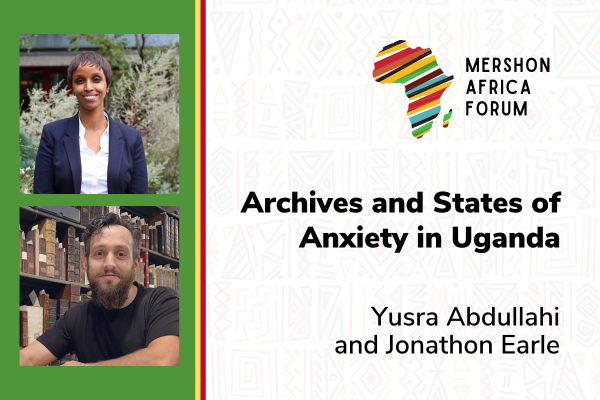
This is a Mershon Center event. Moderated by Lydia Walker.
“Archives and States of Anxiety in Uganda” showcases a research conversation featuring Yusra Abdullahi (Leiden University, the Netherlands) and Jonathan Earl (Centre College, Kentucky) on and in Uganda and its regional, global, and historical contexts. They will present and discuss the challenges their individual work has faced and the analytical opportunities it has generated, which connect to current dynamics and living histories in Uganda. Their research revises understandings of global processes of empire, world war, and decolonization at the same time that their work explores how that re-vision process is shaped by whose voices, narratives, and documents are made accessible for such scholarship.
Speakers
Yusra Abdullahi is a Humanitarian Advisor with extensive work experience in Ethiopia, Uganda, Somalia, and Kenya. She has used her regional expertise to advise international NGOs, UN agencies, and think tanks in the intersecting realms of conflict transformation, gender, and migration. Yusra graduated from SOAS with a BA in Politics before pursuing an MA in African Studies at Leiden University. Her research interests include the politics and history of Africa and international development. Currently a PhD Candidate at Leiden University, she is working on the project ‘African Activism at the UN,’ which investigates the development of self-determination and the role the United Nations played in promoting this principle between 1957 and 1980 on the African continent. The project starts with the liberation of Ghana in 1957, and follows the separatist attempts of the Rwenzururu movement in Uganda that began in the early 1960s, and ends in 1980 as Rhodesia transitioned into Zimbabwe. Yusra investigates how African activists used Pan-Africanism to resist overtly unequal racialized systems by establishing critical links between Kwame Nkrumah and actors from former Rhodesia and Uganda.
Jonathon Earle earned his PhD in African History from Cambridge University in 2012. He currently serves as the Co-Chair of the Uganda Studies Group of the African Studies Association. Jon’s first book on the Kingdom of Buganda’s colonial history (Cambridge University Press, 2017) was shortlisted for the Bethwell A. Ogot Book Prize of the African Studies Association, awarded for the best book published on eastern and northeastern Africa.
His second book (James Currey, 2021, with J.J. Carney) is the first history of Catholic political thought in Uganda, which he wrote by using the previously “lost” archives of Benedicto Kiwanuka. Earle’s chapter on ‘African Intellectual History’ contributed to the Oxford Encyclopedia of African Historiography: Methods and Sources, which was awarded the Waldo G. Leland prize by the American Historical Association for the best reference work published over the past five years.
His most recent book, Decolonizing State and Society in Uganda, co-edited, draws scholars together from across three continents to explore how Ugandans have built, disputed, and reimagined institutions of authority and knowledge production. Jon is currently authoring a popular history on Theodore Roosevelt’s 1909–10 African expedition to rethink the eastern African origins of American democracy. The book is currently under film contract with Unction Productions and the Government of Uganda.
Earle’s work on Uganda’s intellectual history has also appeared in the Journal of Eastern African History, History in Africa, and Journal of African History. Jon is the founding editor of the Cambridge History of African Political Thought, and Senior Editor of the Oxford Research Encyclopedia of African History, where he oversees commissions on African intellectual history.
In 2021, Earle was appointed Visiting Fellow at Trinity College, Cambridge, where he has been reappointed as a Fellow for 2024–2025. For his work in promoting the public history of Buganda, he was recently appointed International Research Fellow for the Kingdom.
Jon has taken an active role in Uganda’s public history and heritage management. He helped catalogue the Uganda National Archives, resulting in a multi-million-dollar grant with UNESCO to relocate the state archives from Entebbe to Kampala. He worked with Ugandan archivists to preserve and develop the Soroti District Archives (in eastern Uganda), and has digitized numerous private holdings, including the papers of the co-author of Uganda’s postcolonial constitution, Eridadi Mulira, whose material is now available online through Cambridge University Library.
More recently, Jon was invited to curate the Uganda National Museum’s exhibition on the Democratic Party, the country’s oldest political party, for the country’s 60th year anniversary.


